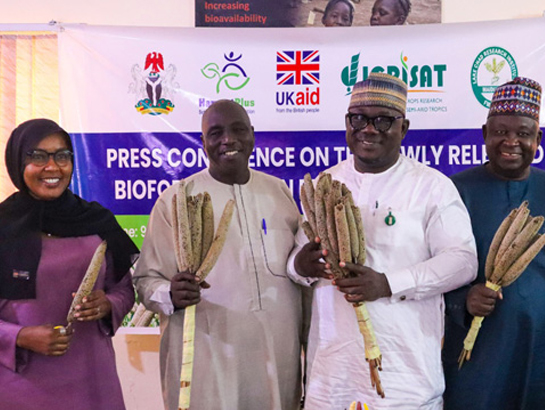In Nigeria, the journey from crop variety release to commercialization typically takes a minimum of three years, leaving many promising varieties stranded before they can reach farmers. This slow adoption process is especially problematic for nutrition-focused initiatives, where timely access to nutrient-dense crops can significantly impact public health. However, 2023 marked a turning point with the successful release and commercialization of the first iron pearl millet (IPM) variety in Nigeria, achieved in just one year through the innovative HarvestPlus Accelerated Release and Commercialization (ARC) model.
Pioneering a New Approach with the ARC Model
HarvestPlus Nigeria developed the ARC Model to address systemic inefficiencies within the seed value chain that hinder the swift adoption of improved varieties. Under the UK International Development Propcom+ program, HarvestPlus partnered with the International Crops Research Institute for the Semi-Arid Tropics (ICRISAT) and the Lake Chad Research Institute to introduce two new varieties of IPM. These varieties not only address Nigeria’s growing nutritional needs but also contribute to climate adaptation strategies for smallholder farmers. By integrating climate-smart production technologies and agronomic training, HarvestPlus is strengthening the resilience of millet farming communities in northern Nigeria. Read more details here.
Securing a Special Release for Biofortified Crops
Under standard procedures, the Nigerian National Varietal Release Committee (NVRC) releases new crop varieties only once a year, usually in December. In early 2023, when IPM varieties were ready for release, waiting another 11 months would have delayed their potential impact. Recognizing the urgency, HarvestPlus engaged NVRC to advocate for a special release event, underscoring the role of biofortified crops in combating hidden hunger. This effort led to a groundbreaking decision—NVRC agreed to a HarvestPlus-funded special release event in January 2023, ensuring that IPM varieties were made available to farmers without unnecessary delay.
Pre-Release Bulking: Overcoming Seed Production Bottlenecks
One of the biggest hurdles in seed commercialization is the lag in Early Generation Seed (EGS) production. Typically, seed companies hesitate to invest in new varieties without clear demand and sufficient seed stock. To overcome this, HarvestPlus collaborated with the National Agricultural Seed Council (NASC) and NVRC to secure permission for pre-release EGS bulking of IPM. As a result, two metric tons of foundation seed were produced before the official release, enabling immediate commercial scaling once approval was granted to multiply the variety as certified seed for farmers. By integrating private sector partners into both seed and grain value chains, HarvestPlus set the stage for the rapid commercialization of IPM.
Private Sector Engagement: Fueling Investment and Market Access
Commercializing a new variety requires more than seed production—it demands investment and market linkages. HarvestPlus played a crucial role in mobilizing private sector participation and raising market demand for IPM. Premier Seeds, a key partner, established an outgrower scheme valued at over NGN400 million (approximately USD 500,000 in 2023), providing farmers with essential inputs such as EGS and fertilizers on credit. The initiative proved highly successful, achieving an impressive 95 percent recovery rate and producing 300 metric tons of certified IPM seed.
On the grain commercialization front, HarvestPlus engaged major millet processors like Dala and Halilco Foods, to secure market opportunities for smallholder farmers. Through a targeted product development exercise, these processors adopted IPM as a raw material of choice, committing to off-take approximately 5,000 metric tons of IPM grain in 2023. This assured demand provided critical incentives for farmers to adopt IPM at scale.
Scaling Up for Future Impact
The rapid success of IPM commercialization has not gone unnoticed. NASC has now invited HarvestPlus to integrate biofortification into Nigeria’s Seed Policy, ensuring that nutrient-dense and climate-smart varieties are prioritized for fast-track release and commercialization. Beyond Nigeria, the lessons learned from the ARC Model present an adaptable framework for accelerating the adoption of biofortified crops across other regions.
By transforming Nigeria’s seed value chain, HarvestPlus has demonstrated that commercialization timelines can be shortened, and improved varieties can reach farmers and consumers faster. The successful rollout of IPM in just one year marks a milestone in agricultural innovation and nutrition security, paving the way for future biofortified crops to flourish in Nigeria and beyond.
